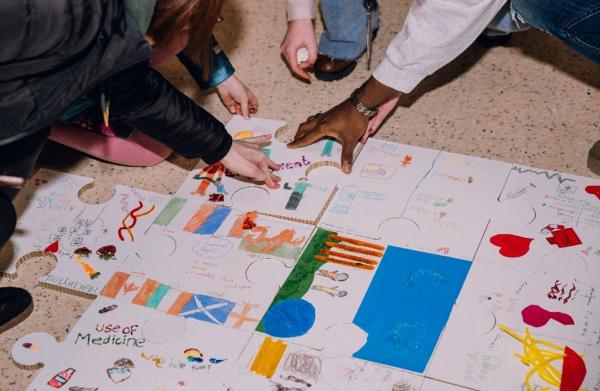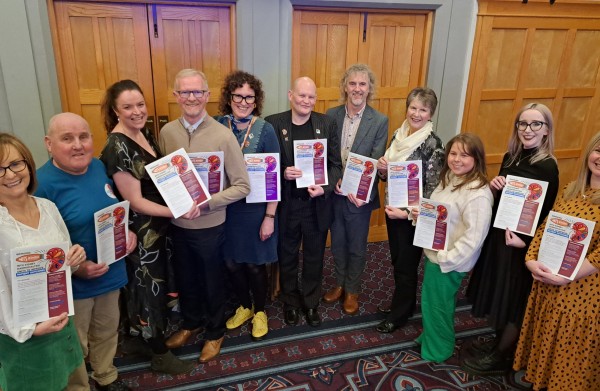What is kidney cachexia?
Patients with kidney cachexia will experience extreme muscle loss, reduced strength and symptoms including fatigue, reduced appetite and lower quality of life. Patients are also at an increased risk of hospitalisation and shortened life expectancy. Previous research suggests that treatments that target several causes of the muscle wasting syndrome (known as cachexia), show better outcomes for patients than treatments using just one method (for example only exercise). Therefore, we want to see if combining different treatments (exercise, dietary counselling and anti-inflammatory supplements) will improve outcomes for patients with kidney failure receiving haemodialysis at risk of developing kidney cachexia, compared to patients who only receive routine kidney care alone.
PPI workshop: Reviewing the proposed intervention
In planning the development of this complex healthcare intervention, we are very aware of the importance of hearing the valuable opinions of those who have experienced kidney disease and been on haemodialysis. Therefore, we hosted a PPI workshop in the Europa Hotel on Thursday 2nd November 2023, kindly funded by our QUB PPI Network and supported by Northern Ireland Kidney Research Fund (NIKRF) and Northern Ireland Kidney Patients Association (NIKPA), to review the proposed intervention and discuss how we adapt the language and modality of the components to ensure it is as accessible as possible.
PPI workshop highlights
Through the workshop we raised awareness of kidney cachexia, shared findings of our latest kidney cachexia studies (Blair et al., 2022a, 2022b) and presented the evidence for combined treatments which include anti-inflammatory supplements, in conjunction with exercise and dietary counselling, alongside our theory of how this intervention could work. Most importantly we asked for the insights from PPI representatives as to how this could be designed to be as accessible as possible for patients. As key highlights of the event we invited Fiona Loud an influential renal PPI representative from Kidney Care UK to speak about the importance of patient involvement in research and quality improvement. Fiona has been policy director of Kidney Care UK (formerly known as the British Kidney Patient Association), the leading grant-giving charity supporting kidney patients in the UK, since 2013. Fiona has been on a number of NICE Development and Topic Expert Groups including Chronic Kidney Disease (CKD) Quality Standards, Acute Kidney Injury and CKD Guidelines and was deemed one of the inaugural Health Service Journal top 50 patient leaders. A further highlight of the event included the sharing of a narrative written by William Johnston, specifically on kidney cachexia. William is an Honorary Lecturer at the School of Nursing and Midwifery, diligently supporting the growing reputation of the PPI work within the School and focused on facilitating and fostering effective and meaningful co-production between patients, carers and staff. William has considerable lived experience and is a dedicated advocate for patients living with kidney disease, having contributed significantly to global research projects and expert advisory groups, whilst making a difference through his artistic endeavours.
The value and importance of PPI representatives: Workshop findings
PPI representatives such as William, have been part of the programme of kidney cachexia work since its inception in 2015. PPI representatives have held roles such as co-author and co-applicant in our programme of research. They have been involved in the design of the proposed study, including the development of lay abstracts and intervention components. This PPI workshop was particularly helpful in refining various aspects related to the implementation of the multimodal intervention. Key findings included integrating accessible terminology relating to the exercise intervention, the importance of psychosocial support, the acceptability of the intervention for people on haemodialysis and the importance of patient and caregiver education on kidney cachexia, using various forms of multimedia. Overall, PPI representatives at this workshop provided expert patient knowledge and experience that reinforced the acceptability of this multimodal intervention, taking account of any potential patient and clinical burden.
Once again, we are very thankful to the QUB PPI Network for supporting this involvement activity which has brought significant benefit to our ongoing work.
For further information on this ongoing work please contact:
Professor Joanne Reid - j.reid@qub.ac.uk
Dr Carolyn Blair (NIKRF Fellow) - c.blair@qub.ac.uk
Blair C, Slee A, Davenport A, Fouque D, Johnston W, Kalantar-Zadeh K, Maxwell P, McKeaveney C, Mullan R, Noble H, Porter S, Seres D, Shields J, Swaine I, Witham M, Reid J, (2022a). Developing an Evidence and Theory Based Multimodal Integrative Intervention for the Management of Renal Cachexia: A Theory of Change.. Healthcare (Basel, Switzerland). 10 (12).
Blair, C., Shields, J., Mullan, R., Johnston, W., Davenport, A., Fouque, D., Kalantar-Zadeh, K., Maxwell, P., McKeaveney, C., & Noble, H. (2022b). Exploring the lived experience of renal cachexia for individuals with end-stage renal disease and the interrelated experience of their carers: Study protocol. PLoS One.
Related Articles


